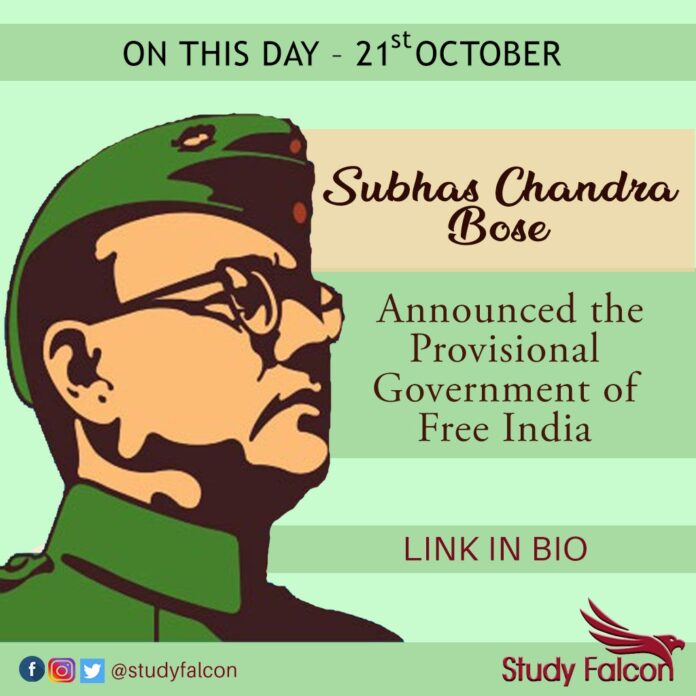On this day 77 years ago, Netaji Subhash Chandra Bose had announced the establishment of the provisional government of Azad Hind in occupied Singapore in 1943. On 21 October 1943, in a dramatic moment in India’s freedom struggle, Congressman-turned anti-British warrior, Subhas Chandra Bose—‘Netaji’ to his followers—announced the establishment of the Provisional Government of Free India.
Known as Arzi Hukumat-e-Azad Hind, it was supported by the Axis powers of Imperial Japan, Nazi Germany, the Italian Social Republic, and their allies. Bose, was convinced that an armed struggle against the mighty British was the only way to throw them out. He had been a leader of the radical wing of the Indian National Congress in the late 1920s and 1930s, rising to become Congress president in 1938 and 1939 but was ousted following differences with Mahatma Gandhi and the Congress leadership.
Back in India, he launched the newspaper Swaraj and became associated with the Bengal chapter of the Congress. In 1923 Bose became president of the All India Youth Congress. He was imprisoned in 1925 along with others for espousing the nationalist cause. He became general secretary of the Congress in 1927. He soon got to know well the leading lights of the independence movement, like Jawaharlal Nehru and Mahatma Gandhi. Bose was an advocate of complete and unconditional independence for India, unlike many Congress leaders who had a more cautious approach.
With the outbreak of the Second World War in 1939, Bose saw an opening to put pressure on the British. But since the Congress foreign policy was clearly in sync with Nehru’s and Gandhi’s belief that opposition to British rule in no way meant supporting Nazi Germany and Imperialist Japan, Bose found himself alone. Forced to resign, he remarked that he was “opposed to Hitlerism whether in India, within the Congress or any other country”. In fact, Bose had few illusions about Nazi
Germany, but he believed in the pragmatic political theory that an ‘enemy’s enemy is my friend’. Similarly, he had nothing against the British people; his opposition was limited to British imperialism.
Though Bose parted ways with the Congress leadership because of ideological difference with Gandhi, he had a lot of respect for the Mahatma. But according to Bose, using non-violence as a tool was not enough to make India free. He therefore launched his own outfit, the All India Forward Bloc, on 3 May 1939. His demand: total and immediate independence from British rule.
Bose advocated mass civil disobedience to protest against the British decision to declare war on India’s behalf without consulting the Indian nationalist leadership. He led protests in Calcutta against this. As always, he was jailed. On his release his house was put under surveillance. He dressed as a Pathan to avoid identification and escaped to Peshawar, helped by friends and well-wishers. On 26 January 1941, he started his journey through the North-West frontier with Afghanistan, also under British rule, to the Soviet Union.
He finally reached Moscow on an Italian passport. But unable to gather support for his cause there, he went to Italy and Germany. In Germany, he instituted the Special Bureau for India and the Free India Centre. In 1943, he left for Japan.
The Azad Hind Fauj or the Indian National Army (INA), first established by Captain General Mohan Singh in Singapore in 1942, had been disbanded. Bose revived it and assumed charge of it. The INA got support from Indians living in Southeast Asia, and even had a women’s wing. It was at an INA rally in Burma in July 1944 that Bose famously said, “Give me blood, and I shall give you freedom!”
Under the provisional government, Bose was the head of the state, the prime minister and the minister for war and foreign affairs. Captain Lakshmi headed the women’s organisation while S A Ayer headed the publicity and propaganda wing. Revolutionary leader Rash Behari Bose was designated as the supreme advisor. The provisional government was also formed in the Japanese-occupied Andaman and Nicobar Islands. The islands were reoccupied by the British in 1945.
Using India’s northeast as an entry point, the Japanese, Burmese and INA troops tried to occupy Kohima and Imphal, but they were forced to retreat. Bose’s dream of ousting the British from India was dashed. With the tide of the war turning against the Japanese, the INA too found it tough to be a credible force. However, it fought on.










